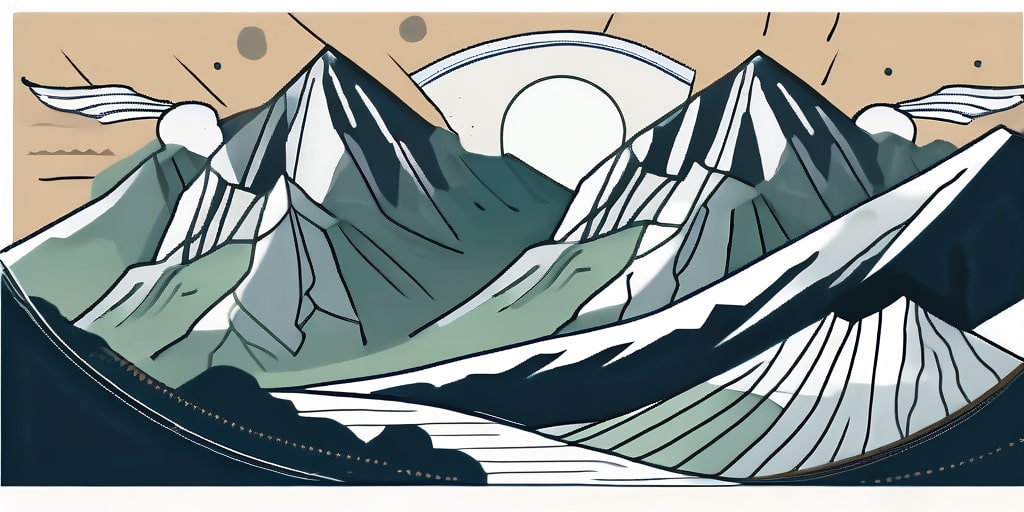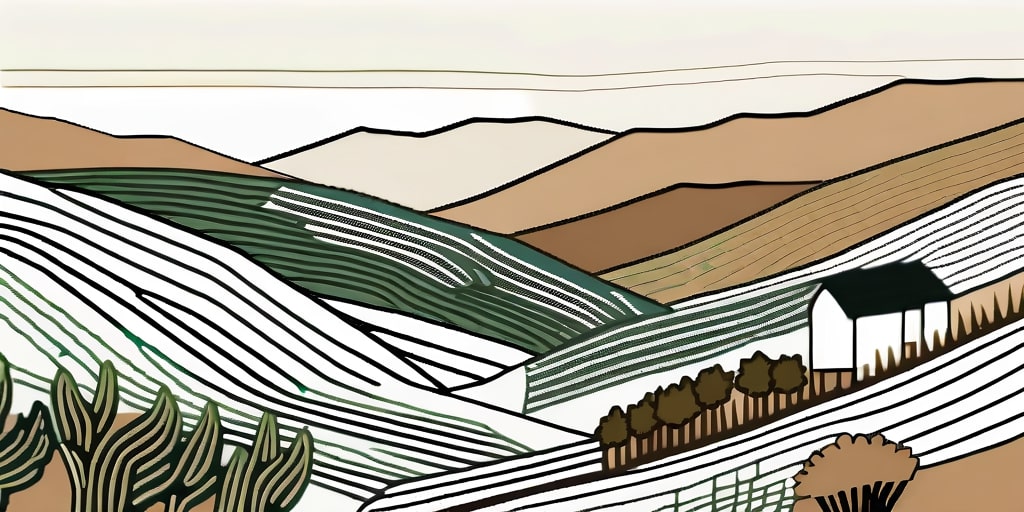In ancient Greece, mountains played a crucial role in shaping the civilization that emerged. The geographical landscape of ancient Greece was characterized by rugged terrains, with mountains dominating the landscape. These mountains not only influenced the physical aspects of the region but also had profound effects on various aspects of Greek society, including economy, defense strategies, mythology, and culture.
Understanding the Geographical Landscape of Ancient Greece
Before delving into the specific ways in which mountains shaped ancient Greek civilization, it is important to gain an understanding of the overall geographical landscape of the region. Ancient Greece was located on the southern tip of the Balkan Peninsula, with the Aegean Sea to the east and the Ionian Sea to the west. Its mainland was adorned with numerous mountains, including the famous Mount Olympus, home of the gods in Greek mythology.

The mountain ranges in Greece were not mere geographical features; they held immense significance in the eyes of the ancient Greeks. Mountains were considered sacred, often associated with gods and goddesses. They were believed to be the dwelling places of deities, and many temples were constructed on the slopes of these mountains. The Greeks looked upon the mountains with awe, believing that they served as a connection between the mortal and divine realms.
Mount Olympus, in particular, held a special place in the hearts of the ancient Greeks. It was not only the highest mountain in Greece, but it was also believed to be the residence of the twelve Olympian gods and goddesses. The majestic peaks of Mount Olympus were said to be the thrones of Zeus and his divine family. The ancient Greeks held grand festivals and ceremonies at the foot of this sacred mountain, paying homage to the gods and seeking their favor.
The Role of the Sea and Coastal Areas
While mountains shaped the inland regions of ancient Greece, the sea and coastal areas played equally important roles in the development of Greek civilization. The Greeks were skilled seafarers, with the Mediterranean Sea and its countless islands serving as conduits for trade, cultural exchange, and the establishment of colonies.
The sea not only provided the Greeks with a means of transportation and trade, but it also influenced their way of life. The coastal regions were rich in resources, such as fish, salt, and various types of seafood. The Greeks developed a deep connection with the sea, becoming expert sailors and fishermen. They built sturdy ships and navigated the treacherous waters with skill and precision.
Moreover, the sea served as a source of inspiration and mythology for the ancient Greeks. They believed that the sea was ruled by Poseidon, the god of the sea and earthquakes. They told tales of mighty sea monsters, heroic sailors, and epic naval battles. The sea was both a provider and a challenge, shaping the identity and culture of the ancient Greeks.
The combination of mountains, sea, and coastal regions created a diverse and vibrant civilization that was both isolated and interconnected at times. The geographical landscape of ancient Greece influenced every aspect of their lives, from their religious beliefs to their economic activities. It is through understanding this landscape that we can truly appreciate the rich and complex history of ancient Greece.
The Influence of Mountains on Greek City-States
One of the defining characteristics of ancient Greece was the presence of independent city-states. These city-states were often isolated from one another due to the rugged mountainous terrains that surrounded them.
Formation and Isolation of City-States
The mountains of Greece played a significant role in the formation and isolation of city-states. The rugged terrain made it difficult for large territories to be controlled by a central power, leading to the emergence of independent city-states with their own governments and laws. The mountainous regions acted as natural barriers, providing protection and isolation for these city-states.
Mountainous Terrain and Defense Strategies
The mountains not only isolated the city-states but also influenced their defense strategies. The steep slopes and rocky cliffs of the mountains made it challenging for invading forces to penetrate. City-states such as Athens and Sparta took advantage of their mountainous terrain by constructing fortifications and utilizing guerrilla-style tactics, creating strong defensive positions against potential invaders.
Furthermore, the mountainous terrain of Greece also had a significant impact on the economic activities of the city-states. The rocky landscape limited the amount of arable land available for agriculture, pushing the inhabitants of these city-states to develop other sources of livelihood such as maritime trade and craftsmanship. The abundance of natural resources in the mountains, such as timber and minerals, also played a crucial role in shaping the economic prosperity of these city-states.
Moreover, the mountains were not just physical barriers but also held great symbolic and religious significance for the ancient Greeks. Many of the mountains in Greece were believed to be the dwelling places of gods and goddesses in Greek mythology. The peaks of Mount Olympus, for example, were thought to be the residence of the powerful gods of the Greek pantheon. This spiritual connection to the mountains further reinforced the sense of identity and autonomy of the city-states, as they saw themselves as protected and favored by the divine beings that resided in the lofty peaks.
Mountain’s Impact on Greek Economy and Agriculture
The mountainous terrain of Greece presented both challenges and opportunities in terms of the economy and agriculture of ancient Greek civilization.

Agriculture was a crucial part of the ancient Greek economy, but the mountainous terrain posed significant challenges for farmers. The rugged slopes made it difficult to cultivate large tracts of land, limiting the availability of fertile soil. However, the resourceful Greeks devised innovative farming techniques such as terracing, which involved cutting steps into the mountainside to create flat areas for planting crops.
Despite the challenges, the mountainous terrain also provided unique opportunities for agriculture. The higher altitudes offered cooler temperatures, which were beneficial for certain crops that thrived in such conditions. Additionally, the mountains acted as natural barriers, protecting some crops from pests and diseases that plagued lower-lying areas.
Mining and Trade Opportunities
While farming faced challenges, the mountains offered abundant mineral resources such as marble, gold, silver, and lead. Mining became a significant industry in ancient Greece, with the city-state of Athens becoming famous for its marble quarries. The exploitation of these resources not only provided valuable materials for construction and trade but also fueled the development of urban centers and the growth of the economy.
Furthermore, the strategic location of some mountainous regions facilitated trade with neighboring civilizations. The mountain passes served as important trade routes, connecting Greece to other regions and enabling the exchange of goods, ideas, and culture. This trade network not only boosted the economy but also contributed to the cultural richness and diversity of ancient Greek society.
Mountains and Greek Mythology
The ancient Greeks had a rich mythology that was closely intertwined with their natural surroundings, including the mountains.

Mountains played a central role in Greek mythology, believed to be the dwelling places of gods and goddesses. Mount Olympus, the highest mountain in Greece, was considered the home of the twelve Olympian gods, with Zeus as their leader. The gods often descended from the mountains to interact with mortals, influencing their lives and shaping their destinies.
Sacred Mountains and Temples in Ancient Greece
Many mountains in ancient Greece were considered sacred and were adorned with temples dedicated to specific gods or goddesses. For example, Mount Parnassus was the sacred home of Apollo and the site of the famous Oracle of Delphi, where people sought divine guidance and prophecies. These sacred mountains and temples served as important religious and cultural centers, drawing worshippers and pilgrims from all over Greece.
The Effect of Mountains on Greek Culture and Philosophy
Mountains influenced not only the religious beliefs but also the cultural and philosophical perspectives of ancient Greeks.
The Concept of Autonomy and Self-Governance
The isolation created by the mountains contributed to the development of a strong sense of autonomy and self-governance among the ancient Greeks. Each city-state had its own unique identity and system of government, fostering a sense of independence and individuality. This concept of autonomy and self-governance became fundamental to Greek culture and influenced their political and social structures.
Philosophical Perspectives Shaped by Nature
The natural beauty and grandeur of the mountains were a source of inspiration for ancient Greek philosophers. Philosophers such as Plato and Aristotle often sought solitude in the mountains, contemplating the mysteries of the universe and the nature of existence. The connection between nature and philosophy was deeply ingrained in Greek culture, with the mountains serving as a backdrop for intellectual exploration and the pursuit of knowledge.
In conclusion, mountains played a multifaceted role in shaping civilization in ancient Greece. From influencing the physical landscape to shaping economic, defense, and cultural aspects, the mountains left an indelible mark on Greek society. The mountains not only provided challenges but also presented unique opportunities, enabling the Greeks to develop innovative solutions and thrive in their rugged and mountainous homeland. The deep reverence for mountains and their significance in mythology and philosophy highlight their lasting impact on ancient Greek civilization.
